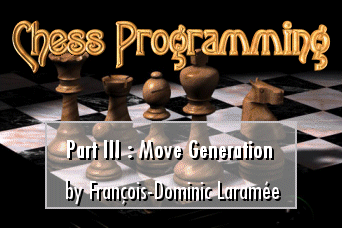11/10 - 11/12 @ Montréal, Canada
12/5 - 12/7 @ Shanghai, China
12/24 - 12/27
2/28 - 3/4 @ San Francisco, CA
More events...
2406 articles in the reference section.
Help us fight cancer!
Join SETI Team GDNet!

|
Ordering Moves To Speed Up SearchAs we will see next time, search efficiency depends on the order in which moves are searched. The gains and losses related to good or poor move ordering are not trivial: a good ordering, defined as one which will cause a large number of cutoffs, will result in a search tree about the square root of the size of the tree associated with the worst possible ordering! Unfortunately, it turns out that the best possible ordering is simply defined by trying the best move first. And of course, if you knew which moves are best, you wouldn't be searching in the first place. Still, there are ways to "guess" which moves are more likely to be good than others. For example, you might start with captures, pawn promotions (which dramatically change material balance on the board), or checks (which often allow few legal responses); follow with moves which caused recent cutoffs at the same depth in the tree (so-called "killer moves"), and then look at the rest. This is the justification for iterative deepening alphabeta, which we will discuss in detail next month, as well as the history table we talked about last time. Note that these techniques do not constitute forward pruning: all moves will be examined eventually; those which appear bad are only delayed, not eliminated from consideration. A final note: in chess, some moves may be illegal because they leave the King in check. However, such an occurrence is quite rare, and it turns out that validating moves during generation would cost a tremendous amount of effort. It is more efficient to delay the check until the move is actually searched: for example, if capturing the King would be a valid reply to Move X, then Move X is illegal and search should be terminated. Of course, if search is cutoff before the move has to be examined, validation never has to take place.
|
|
|
|
|